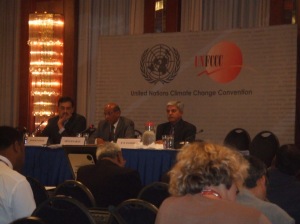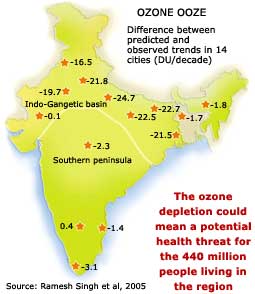/topics/climate-change
Climate Change
Campaigns aimed at battling climate change being organized in Karnataka
Posted on 19 Aug, 2009 09:09 PMYou too can play an active role in these activities. Use the contacts provided in this newsreport to be an active member of the global climate change crusade.
Fighting climate change: Greenpeace
Posted on 19 Aug, 2009 08:55 PMGreenpeace has done a lot of commendable work in the field of climate change. This link takes you through their climate change campaigns involving the masses.
District level vulnerability to climate change: An IPCC assessment
Posted on 19 Aug, 2009 03:26 PMOn a scale of 5, from lowest to highest, this map shows the vulnerability of various districts of the country to climate change. The map shows many of these regions are doubly exposed to the risk of climate change.
Invitation: 3rd world climate conference (WCC-3 2009),31 Aug 2009, London
Posted on 02 Aug, 2009 08:27 PMImage and Content Courtesy: United Nations 
On behalf of the Organizing and Scientific Committee,the United Nations is pleased to invite you to participate at the 3rd World Climate Conference (WCC-3 2009). The conference is scheduled from 31 August - 4 September 2009 at the International Conference Center London, United Kingdom. Conference Theme is: "Climate prediction and information for decision-making: focusing on scientific advances in seasonal to interannual timescales, taking into account multi-decadal prediction". The WCC-3 2009 steering Committee welcomes Scientists, climate service providers, High-level policy-makers, Global business leaders,Decision-makers from the public and private sectors, Green visionaries, Academia, IO's and NGO's, Professionals in relevant fields, Women and Youth Organizations, Development Groups, Governmental Agencies, Civil Society Organizations, Community Development Organizations, Donor Agencies and Individuals working in the related field to participate and submit papers and proposals for presentation at the interactive sessions and workshops. Papers should broadly explore the conference theme. The presentations may be completed research, research in-progress or case studies, especially those reflecting innovative Green building practice. Generally the presentations will consist of a panel of three or four presenters with similar topics. Each presenter will speak for ten minutes and after all presentations are completed the floor will be opened for questions and discussions.
The economics of climate change in Southeast Asia: a regional review
Posted on 13 Jul, 2009 09:53 AMClimate change will affect everyone but developing countries will be hit hardest, soonest and have the least capacity to respond. South East Asia is particularly vulnerable to the impacts of climate change with its extensive, heavily populated coastlines, large agricultural sectors and large sections of the population living under $2 or even $1 a day.
The “Bonn” of contention
Posted on 06 Jul, 2009 06:54 AMAs the Bonn climate talks have come to a close we would like to bid farewell to frequent long blog posts and continue to facilitate a knowledge dialogue with our negotiators and key officials who have a direct stake in the process to forming our Bonn of contention for 10-14th August when all climate leaders would be meeting again. [caption id="" align="alignleft" width="300" caption="Dr.Shyam Saran at the press conference"] [/caption] For India, since only a very limited population has its outreach in the internet world, we plan to get the word out through vernacular media into different and remote regions of India. Considering India has around 20 official languages and over 100 different dialects, we pay respect to our rich diversity by approaching outreach through radio and local language newspapers along with blogging. On 12th of June, Mr Shyam Saran was extremely unhappy with the pace at which the negotiations were proceeding, as he said so in the press conference he held at the UNFCCC negotiations. Through the various meetings at Bonn and some post Bonn meetings with some high level officials involved associated with the delegations, the following main points came through:
[/caption] For India, since only a very limited population has its outreach in the internet world, we plan to get the word out through vernacular media into different and remote regions of India. Considering India has around 20 official languages and over 100 different dialects, we pay respect to our rich diversity by approaching outreach through radio and local language newspapers along with blogging. On 12th of June, Mr Shyam Saran was extremely unhappy with the pace at which the negotiations were proceeding, as he said so in the press conference he held at the UNFCCC negotiations. Through the various meetings at Bonn and some post Bonn meetings with some high level officials involved associated with the delegations, the following main points came through:
Post-doctoral research positions: UNESCO-IHE
Posted on 03 Jul, 2009 09:41 PMForwarded to the Portal by Ewoud Kok, UNESCO-IHE ====  The UNESCO-IHE Partnership Research Fund announces an interdisciplinary post-doctoral research programme to investigate the many challenges of adapting to climate change from different water related perspectives.
The UNESCO-IHE Partnership Research Fund announces an interdisciplinary post-doctoral research programme to investigate the many challenges of adapting to climate change from different water related perspectives.
Climate change treaty : The deal of our life
Posted on 16 Jun, 2009 12:49 AMDecember this year in Copenhagen the countries of the world are going to sign a treaty that will change our life as we know it. Their commitments today will affect our quality of life tomorrow.
Rain Shocked-Climate change and the rainfall pattern
Posted on 11 Jun, 2009 02:40 PMThe research study was published in Down to Earth in March 2009 issue. The study describes how climate change is leading to a rising trend of short but intense spells of rainfall, which is making usable water scarce in India.






